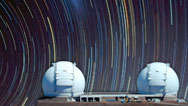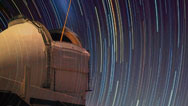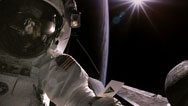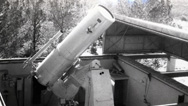The Founders of Modern Astronomy
- By Melissa Salpietra
- Posted 03.01.10
- NOVA
In the late 1700s, the English astronomer William Herschel made systematic and methodical observations of the night sky that would forever change the way the world sees the heavens. But as this video extra shows, behind all Herschel's discoveries, including that of the planet Uranus, stood his sister and collaborator Caroline.
Transcript
The Founders of Modern Astronomy
Posted: March 3, 2010
NARRATOR: During the late 1700's, William Herschel along with the help of his sister Caroline, made systematic and methodical observations of the night sky that would forever change the way the world sees the heavens.
JIM BENNETT (Oxford University): Herschel undertakes this systematic sweep, as he called it of the entire heavens. He does this several times. And that is where his lucky break comes in. He discovers a planet, the planet Uranus.
NARRATOR: With this discovery, and his organized observations, some believe Herschel is the father of modern astronomy. But behind all his endeavors was his sister.
DAVID DEVORKIN (National Air and Space Museum): His sister Caroline she was one of his true secret weapons in achieving his insights because she helped him organize his research, she helped him get interested in things. She was very much an independent thinker. But she was devoted to facilitating his work.
NARRATOR: William Herschel's work wasn't always stargazing. He started out in a very different field.
JIM BENNETT: Hershel is a musician. He is a clarinet player, he's an impresario, he is a composer, he is an organist. But his real passion isn't music, it is astronomy.
NARRATOR: As amateur astronomers, the siblings relied on a do-it-yourself approach. Together, in a workshop at the rear of their house, they crafted homemade telescopes. At the heart of each telescope was a mirror made from a metal disk.
MICHAEL HOSKIN (Cambridge University): He'd take this disc and a grinding tool and he'd work away, hollowing this disc out. Working steadily towards the ideal parabolic shape that he wanted so that the light as it came down would bounce off this mirror and come back to a perfect focus. He'd be working away turning this disc round, but all the time, keeping hands-on contact. While he was doing this, poor Caroline would have to entertain him and feed him.
CAROLINE: By way of keeping him alive, I was constantly obliged to feed him by putting the victuals by bits into his mouth. This was once the case when finishing o¬f a 6 in mirror he had not left his hands from it for 16 hours.
NARRATOR: It was with these homemade telescopes that Herschel, in March of 1781, discovered Uranus, the seventh planet. In doing so, he changes not only the known solar system, but his life as well.
JIM BENNETT: The planets have been identified since the dawn of written astronomy. And suddenly you have this clarinet player with homemade telescopes in his back garden and he discovers another one. The thing is utterly astonishing. So he suddenly becomes a celebrity.
NARRATOR: William's discovery brings him a pension from King George the Third. Caroline is also recognized for her work and becomes the first professional woman astronomer. Together, with their newfound fame, the Herschel's embark on an ambitious plan. They construct the world's largest telescope, and use it to survey the entire sky.
JIM BENNETT: The program that Hershel had for building giant telescopes of using them to work out the large-scale structure of the universe without any boundaries, as far as you can see, is of course the very basic program of modern astronomy and Hershel does invent that.
NARRATOR: Herschel may deserve credit as a founder of modern astronomy, but he was not alone in his discoveries.
DAVID DEVORKIN: He was a great observer a great instrument builder and a great planner of scientific agenda. But he also had a great sister.
Credits
Original video
- produced and directed by
- Peter Jones
- Edited by
- Nigel Ashcroft
Video short
- reversioned for NOVA by
- Melissa Salpietra
Hunting the Edge of Space produced for NOVA by Brook Lapping Productions and TPT National Productions, in association with Green Umbrella Films, LLC.
Related Links
-

Hunting the Edge of Space: Hr 1
The Mystery of the Milky Way: From Galileo's to today's, telescopes have opened grand vistas onto our galaxy and beyond.
-

Hunting the Edge of Space: Hr 2
The Ever-Expanding Universe: Huge new telescopes are poised to penetrate the enigmas of dark matter and dark energy.
-

Hubble's Amazing Rescue
The unlikely story of how the world's most beloved telescope was saved
-

Preserving the Astronomical Past
Are century-old, original images of the cosmos worth saving in an era of digitized astronomy?

